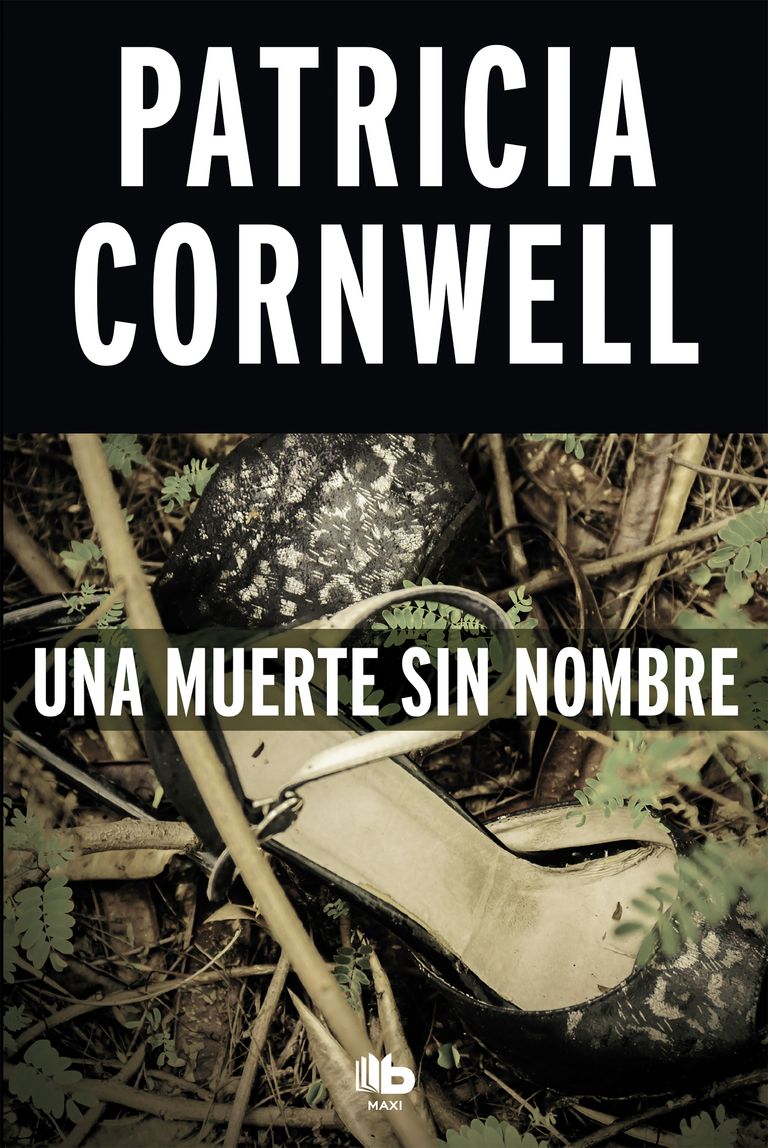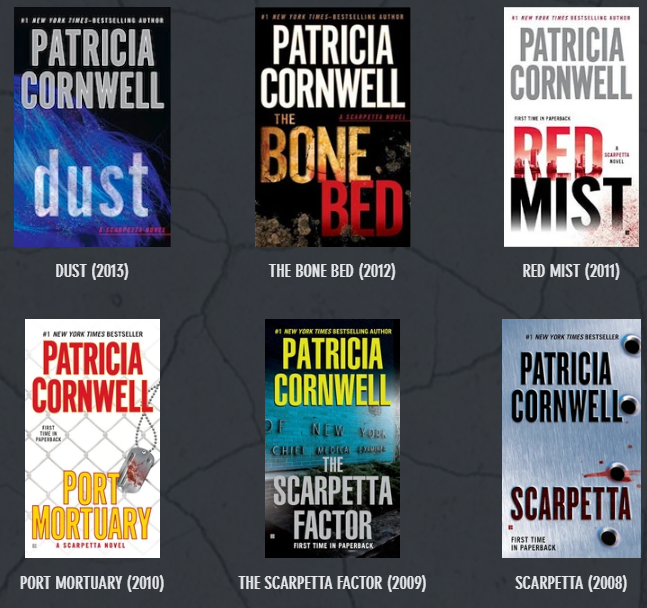
I continue to share with all #BLURT readers the books of one of my favourite writers: Patricia Cornwell.
Today I am going to deal with the sixth book dedicated to the saga with Kay Scarpetta, the famous anatomopathologist, as the main protagonist, accompanied as always by her niece Lucy Farinelly and the faithful detectie and friend Pete Marino.
From Potter's Field a name was originally published in 1995.
This time Kay will have to face for the last time the very dangerous serial killer Temple Gaul (she already escaped him in ‘Unusual and Cruel’), who will be responsible for the murder of her twin Jayne, the NYPD. Jimmy Davila and Deputy Sheriff Brown of Richmond.

It is Christmas Eve night.
Kay Scarpetta, Virginia's chief medical examiner and the FBI's permanent consultant in forensic pathology, is about to leave for Miami to join her family, her mother is hospitalised in serious health condition and Lucy is still not fully recovered from the bad affair with Carrie Grethen.
While examining a body, she is alerted that the body of an unknown woman has been found in Central Park. The woman was murdered by Temple Gault, the serial killer Kay had chased a few years earlier, the modus operandi is the same as the other victims, and Kay, Marino and Benton go to New York to investigate.
‘We had been chasing this man for years and it was impossible to make a complete list of all the damage he had caused. We didn't know how many people he had attacked and killed, but we were sure there were at least five, including a pregnant woman who had worked for me and a thirteen-year-old boy named Eddie Heath. We didn't know how many lives he had poisoned with his crimes, but mine was certainly one of them.’
It's the beginning of a nightmare and the victims are destined to mount, until Kay realises that Temple Gault's real target is only her...
THE NIGHT BEFORE CHRISTMAS
She walked confidently into the deep snow of Central Park. It was already late, though he didn't know exactly what time it was. The rocks toward the Ramble were a black mass under the stars. He could hear and see his own breathing: Temple Gault was not like other people. He had always been a magical being, a god incarnate in a human body. He walked where anyone else would have slipped and knew no fear. From under the visor of his baseball cap, his eyes scanned the darkness.
When he reached the exact spot he crouched down, pushing aside the lapel of his long black coat. He dropped an old military backpack on the snow and raised his bare, bloody hands, cold but not yet frozen, in front of his face. Gault didn't like gloves unless they were made of latex, but unfortunately latex didn't get warm. He washed his hands and face in the soft white snow, then scooped it up into a blood-soaked ball and placed it next to his backpack. He could not abandon either one or the other.
He smiled with his thin lips. Then, like a dog happy to dig in the sand, he pounced on the layer of snow to wipe away the footprints and search for the emergency exit. There it was, right where he thought it would be. He continued digging in the snow until he found the aluminium foil he had folded and inserted between the hatch and the frame. He grabbed the handle and lifted the sunken lid off the ground. Underneath he could see the dark bowels of the underground and the shrill rattle of a train. He dropped the military rucksack and the snowball inside. As he descended, his boots rattled the iron ladder.
The Christmas Eve night was cold and dotted with treacherous slabs of blackened ice. Scanners emitted the croaking soundtrack of service calls. I was rarely dropped off after dark in Richmond's working-class neighbourhoods. I used to be the driver. I used to be the lone driver of the blue morgue van arriving at the scene of violent and unexplained crimes. That night, however, I was in the passenger seat of a Crown Victoria, enveloped by the notes of Christmas music and the voices of agents and dispatchers talking to each other in code.
‘Father Christmas has turned just ahead.’ I waved. ‘I guess the sheriff got lost.’
‘Yeah, well, let's just say he's completely lost,’ Captain Pete Marino, commander of the violent precinct we were passing, corrected me. ‘Next time we stop, try looking him in the eye.’
No surprise there. In his private life, Sheriff Lamont Brown drove a Cadillac and wore heavy gold jewellery; the local community, however, adored him for the role he played at the time. Those of us who knew the truth dared not say a word. To say that Father Christmas doesn't exist is still sacrilege, but in that case Father Christmas didn't exist at all: Sheriff Brown snorted cocaine and probably stole half of what he was given each year to pay for the Christmas tree.
No surprise there. In his private life, Sheriff Lamont Brown drove a Cadillac and wore heavy gold jewellery; the local community, however, adored him for the role he played at the time. Those of us who knew the truth dared not say a word. To say that Father Christmas doesn't exist is still sacrilege, but in that case Father Christmas didn't exist at all: Sheriff Brown snorted cocaine and probably stole half of what he was given each year to hand out in person to the poor. He was a real bastard. In light of our mutual contempt, he had recently even gotten me on the jury in a trial.
The windscreen wipers clattered on the icy crust of the windscreen and snowflakes swirled as they brushed against Marino's car. After passing through the halo of light from the street lamps, the white virgins of the ball became spots as black as the ice that covered the streets. The cold was biting. Most of the town was barricaded indoors, with lighted trees leaning out of the windows and the fireplace burning. Karen Carpenter's dreamy white Christmas was rudely interrupted by Marino, who changed the channel.
‘I don't respect a woman who plays the drums.’ He squeezed the lighter hard.
‘Karen Carpenter is dead,’ I said, as if that was enough to protect her from further insults. ‘And now she didn't even play the drums.’
‘Uh, yeah.’ She pulled out a cigarette. ‘She was suffering from one of those food-related diseases... I can't remember what it's called.’
The Mormon Tabernacle Choir burst into Hallelujah. The next morning I had to go to Miami to visit my mother, my sister and Lucy, my niece. My mother had been in the hospital for weeks. She had been a heavy smoker in the past, just like Marino. I opened a crack in the window.
‘And then her heart stopped... in fact, that's what fucked her up in the end,’ he continued.
‘That's what fucks everybody up in the end, Pete,’ I sentenced.
'Not here. In this fucking place it's the lead contamination that fucks you up.’
We were wedged between two Richmond police squad cars with red and blue lights flashing on the roof, amid a procession of cars crammed with officers, reporters and TV crews. At each stop, media representatives manifested their Christmas spirit by catapulting out armed with notepads, microphones and cameras to capture sentimental shots of the beaming Father Christmas handing out food parcels and gifts to the neighbourhood's forgotten children and their hallucinating mothers. Marino and I, on the other hand, were handing out blankets, my personal donation that year.
As we rounded the corner onto Magnolia Street at Whitcomb Court, the doors flew open and I caught a flash of red as Father Christmas dived into the headlights followed by Richmond's police chief and other bigwigs. Illuminated cameras hovered like flying saucers over the crowd. There was an explosion of flashes.
Marino cursed, submerged under the pile of blankets. This sucks. Where'd you get them, a pet shop?’
‘They're warm, they wash quickly, and in case of fire they don't give off toxic fumes like cyanide,’ I replied.
‘Jesus, what happy thoughts!’.
I looked outside, wondering where we were.
‘I wouldn't even use them for the doghouse,’ Marino insisted.
‘You don't have a dog or a kennel, and no one has offered you anything anyway. Why did we stop here? This house is not on the list.’
‘Good question.’
Journalists, police and social workers crowded in front of the entrance to one of the many identical buildings in that concrete neighbourhood that looked like a military dormitory. Marino and I fought our way through the crowd and the sea of cameras floating in the darkness, dominated by the fireworks of flashbulbs and Santa's cheers of ‘Oh! Oh!
At last we reached the flat. The sheriff had lifted a black boy onto his lap and was handing him some wrapped toys. The boy's name was Trevi and he was wearing a light blue hat with a marijuana leaf printed on the visor. He had two huge eyes. Sitting on the man's red velvet lap, next to a tree decorated with little lights, his gaze seemed lost. The tiny, overheated room was airless and smelled of grease.
‘Make way, madam.’ A cameraman nudged me aside.
‘Leave it there.’
‘Where are the other toys?’
‘Please, ma'am, step back.’ The cameraman almost knocked me down. I was starting to get really nervous.
‘We need another package...’
‘No. It's here, look.’
‘... Food stuff. Oh, yeah, that's fine. Thank you.’
‘If you're on welfare,’ the cameraman apostrophised, “why don't you get back there, eh?”.
‘If you used even half the brain you have you'd realise that the lady is not on welfare,’ Marino interjected, giving him an eloquent look.
On the sofa, an old woman in a flared apron burst into tears, and an officer sat beside her to console her. Marino approached me, ‘Her daughter was killed last month. The King case, remember?’ he whispered in my ear.
I shook my head. No, I didn't remember. The cases were too many.
The one we think killed her is a drug-dealing bastard named Jones,’ he continued, trying to jog my memory.
I shook my head again. Even the drug-dealing bastards were too many, and Jones was not an uncommon surname.
The cameraman was filming the scene, and when Santa stared at me, I turned my head away. The cameraman crashed violently into me again.
‘I wouldn't do that again if I were you,’ I admonished him in a threatening tone.
The reporters had focused on the grandmother, the real protagonist of the evening: a young woman had been murdered, the victim's mother was crying, and Trevi was an orphan. With the spotlight off, the sheriff put the girl back on the ground.
‘Captain, I'm taking one of your blankets,’ said a social worker.
‘I really don't understand why we came here,’ he commented, extending the whole package to her. ‘I'd like someone to explain it to me.’
‘There is only one child in this house,’ the assistant replied. ‘These are too many.’ She grabbed a blanket and handed the package back offended, as if Marino had somehow disobeyed her.
‘Yes, but in theory there should be four children. I'm telling you, this dump wasn't on the list,’ she grumbled.
At that point I was joined by a reporter. ‘Dr. Scarpetta, why are you here tonight, are you waiting for someone to die?’
He worked for a local newspaper that had never treated me with special consideration. I pretended not to hear him. At that point, Santa slipped into the kitchen - unusual behaviour, since it wasn't his house and he hadn't asked anyone's permission. But Grandma, slumped on the couch, didn't even seem to notice him.
I knelt down next to Trevi, who had remained alone on the floor, still lost in front of his wonderful toys. ‘What a nice fire engine,’ I commented.
‘Look, it lights up. He showed me a little red light on the roof of the fire engine, which flicked a small switch and began to flash.
Marino also came over and knelt down next to us. ‘Did they give you extra batteries? Despite trying to sound gruff, he couldn't hide the smile in his voice. ‘You have to get them in the right size. See this flap? You have to put them in there, okay? You have to use those...’
The first shot echoed through the kitchen like the backfire of an internal combustion engine. Marino's gaze turned icy. He drew his gun from his holster, while Trevi crouched on the floor with his back arched. Instinctively, I shielded him with my body. The gunfire continued as the magazine of a semi-automatic emptied against an unspecified target near the rear entrance.
‘Get down! Get down!’
‘Oh, God!’
‘Jesus!’
Cameras and microphones fell and shattered as the crowd screamed and struggled to reach the exit or crush to the ground.
‘Everybody on the ground!’
Marino lunged in the direction of the kitchen, clutching the nine millimetre with both hands. Suddenly the gunfire ceased and the room fell silent.

I like Patricia Cornwell's novels because Kay Scarpetta is such a great character. She is a smart and brave woman who fights evil in the company of her trusted friends and her beloved niece.
It is a novel full of suspense and twists.
The characters are well delineated, even if we meet them through the eyes of the protagonist.
The descriptions of the autopsies and the software used were novel in the nineties, reading it now doesn't have the same effect, but it is an entertaining novel.

Sigo compartiendo con todos los lectores de #BLURT los libro de uno de mis escritores preferidos: Patricia Cornwell.
Hoy me voy a ocupar del sexto libro dedicado a la saga con Kay Scarpetta, la célebre anatomopatóloga, como protagonista principal, acompañada como siempre por su sobrina Lucy Farinelly y el fiel detectie y amigo Pete Marino.
Una Muerte Sin Nombre fue publicado originalmente en el año 1995.
En esta oportunidad Kay tendrá que enfrentarse por última vez al muy peligroso asesino en serie Temple Gaul (ya se le escapó en "Unusual and Cruel"), quien será el responsable del asesinato de su gemela Jayne, la policía de Nueva York. Jimmy Dávila y el ayudante del sheriff Brown de Richmond.


Es la noche de Nochebuena.
Kay Scarpetta, médico forense jefe de Virginia y consultora permanente en patología forense del FBI, está a punto de partir hacia Miami para reunirse con su familia, su madre está hospitalizada en graves condiciones de salud y Lucy aún no se recupera del todo de la mala aventura con Carrie Grethen.
Mientras examina un cuerpo, se le alerta que han encontrado el cuerpo de una mujer desconocida en Central Park. La mujer fue asesinada por Temple Gault, el asesino en serie que Kay persiguió unos años antes, el modus operandi es el mismo que el de las otras víctimas, y Kay, Marino y Benton van a Nueva York a investigar.
“Llevábamos años persiguiendo a este hombre y era imposible hacer una lista completa de todo el daño que había causado. No sabíamos a cuántas personas había atacado y matado, pero estábamos seguros de que eran al menos cinco, incluida una mujer embarazada que había trabajado para mí y un niño de trece años llamado Eddie Heath. No sabíamos cuántas vidas había envenenado con sus crímenes, pero la mía fue sin duda una de ellas."
Es el comienzo de una pesadilla y las víctimas están destinadas a aumentar, hasta que Kay se da cuenta de que el verdadero objetivo de Temple Gault es sólo ella...
LA NOCHE ANTES DE NAVIDAD
Caminó con confianza hacia la nieve profunda de Central Park. Ya era tarde, aunque no sabía exactamente qué hora era. Las rocas hacia el Ramble eran una masa negra bajo las estrellas. Podía oír y ver su propia respiración: Temple Gault no era como los demás. Siempre había sido un ser mágico, un dios encarnado en un cuerpo humano. Caminó donde cualquier otro habría resbalado y no conoció el miedo. Desde debajo de la visera de su gorra de béisbol, sus ojos escudriñaron la oscuridad.
Cuando llegó al lugar exacto se agachó, apartando la solapa de su largo abrigo negro. Dejó una vieja mochila militar sobre la nieve y levantó sus manos desnudas y ensangrentadas, frías pero aún no congeladas, frente a su cara. A Gault no le gustaban los guantes a menos que estuvieran hechos de látex, pero desafortunadamente el látex no se calentaba. Se lavó las manos y la cara en la suave nieve blanca, luego la recogió y formó una bola empapada de sangre que colocó junto a su mochila. No podía abandonar ni a uno ni a otro.
Sonrió con sus finos labios. Luego, como un perro feliz de cavar en la arena, se abalanzó sobre la capa de nieve para borrar las huellas y buscar la salida de emergencia. Allí estaba, justo donde pensó que estaría. Continuó cavando en la nieve hasta que encontró el papel de aluminio que había doblado e insertado entre la trampilla y el marco. Agarró el asa y levantó la tapa hundida en el suelo. Debajo se veían las oscuras entrañas del metro y el estridente traqueteo de un tren. Dejó caer la mochila militar y la bola de nieve dentro. Mientras descendía, sus botas hicieron sonar la escalera de hierro.
La noche de Nochebuena era fría y estaba salpicada de traicioneras placas de hielo ennegrecido. Los escáneres emitían la graznante banda sonora de las llamadas de servicio. Rara vez me dejaban al anochecer en los barrios obreros de Richmond. Yo solía ser el conductor. Yo solía ser el conductor solitario de la furgoneta azul de la morgue que llegaba a la escena de crímenes violentos e inexplicables. Aquella noche, sin embargo, ocupaba el asiento del copiloto de un Crown Victoria, envuelto por las notas de la música navideña y las voces de agentes y expedidores que hablaban entre sí en clave.
«Papá Noel ha girado justo delante». Saludé con la mano. «Supongo que el sheriff se ha perdido».
«Sí, bueno, digamos que está completamente perdido», me corrigió el capitán Pete Marino, comandante de la violenta comisaría por la que pasábamos. «La próxima vez que paremos, intenta mirarle a los ojos».
No es ninguna sorpresa. En su vida privada, el sheriff Lamont Brown conducía un Cadillac y lucía pesadas joyas de oro; la comunidad local, sin embargo, le adoraba por el papel que encarnaba en aquella época. Los que sabíamos la verdad no nos atrevíamos a decir una palabra. Decir que Papá Noel no existe sigue siendo un sacrilegio, pero en ese caso Papá Noel no existía en absoluto: el sheriff Brown esnifaba cocaína y probablemente robaba la mitad de lo que le daban cada año para repartirlo en persona entre los pobres. Era un auténtico cabrón. En vista de nuestro mutuo desprecio, hacía poco incluso había conseguido que yo formara parte del jurado en un juicio.
Los limpiaparabrisas repiqueteaban sobre la costra helada del parabrisas y los copos de nieve se arremolinaban al rozar el coche de Marino. Tras atravesar el halo de luz de las farolas, las vírgenes blancas del baile se convirtieron en manchas tan negras como el hielo que cubría las calles. El frío mordía. Casi todo el pueblo estaba atrincherado en casa, con árboles iluminados asomando por las ventanas y la chimenea encendida. La blanca Navidad soñada por Karen Carpenter fue interrumpida bruscamente por Marino, que cambió de canal.
«No respeto a una mujer que toca la batería». Apretó con fuerza el encendedor.
«Karen Carpenter está muerta», dije, como si eso bastara para protegerla de más insultos. «Y ahora ni siquiera tocaba la batería».
«Eh, sí». Sacó un cigarrillo. «Sufría una de esas enfermedades relacionadas con la comida... no recuerdo cómo se llama».
El Coro del Tabernáculo Mormón estalló en Aleluya. A la mañana siguiente tenía que irme a Miami a visitar a mi madre, a mi hermana y a Lucy, mi sobrina. Mi madre llevaba semanas en el hospital. En el pasado había sido una fumadora empedernida, igual que Marino. Abrí una rendija en la ventana.
«Y entonces se le paró el corazón... de hecho, eso fue lo que la jodió al final», continuó.
'Eso es lo que jode a todo el mundo al final, Pete', sentencié.
«Aquí no. En este maldito lugar lo que te jode es la contaminación por plomo».
Estábamos encajonados entre dos coches patrulla de la policía de Richmond con luces rojas y azules parpadeando en el techo, en medio de una procesión de coches abarrotados de agentes, periodistas y equipos de televisión. En cada parada, los representantes de los medios de comunicación manifestaban su espíritu navideño saliendo catapultados armados con blocs de notas, micrófonos y cámaras para captar en tomas sentimentales que el radiante Papá Noel repartía paquetes de comida y regalos a los niños olvidados del barrio y a sus alucinadas madres. Marino y yo, en cambio, repartíamos mantas, mi donación personal de aquel año.
Al doblar la esquina por Magnolia Street, en Whitcomb Court, las puertas se abrieron de golpe y capté un destello rojo cuando Papá Noel se zambulló en los faros seguido por el jefe de policía de Richmond y otros peces gordos. Las cámaras iluminadas flotaban como platillos volantes sobre la multitud. Hubo una explosión de flashes.
Marino maldijo, sumergido bajo el montón de mantas. Esto apesta. ¿De dónde las has sacado, de una tienda de animales?».
«Calientan, se lavan rápido y en caso de incendio no desprenden gases tóxicos como el cianuro», respondí.
«¡Jesús, qué pensamientos tan felices!».
Miré fuera, preguntándome dónde estábamos.
«Yo no las usaría ni para la caseta del perro», insistió Marino.
«No tienes perro ni perrera, y de todas formas nadie te ha ofrecido nada. ¿Por qué hemos parado aquí? Esta casa no está en la lista».
«Buena pregunta».
Periodistas, policías y trabajadores sociales se agolpaban frente a la entrada de uno de los muchos edificios idénticos de aquel barrio de cemento que parecía un dormitorio militar. Marino y yo nos abrimos paso a duras penas entre la multitud y el mar de cámaras que flotaban en la oscuridad, dominados por los fuegos artificiales de los flashes y los gritos de júbilo de Papá Noel: «¡Oh! ¡Oh!».
Por fin llegamos al piso. El sheriff había subido a su regazo a un niño negro y le entregaba algunos juguetes envueltos. El niño se llamaba Trevi y llevaba un gorro azul claro con una hoja de marihuana impresa en la visera. Tenía dos ojos enormes. Sentado en el regazo de terciopelo rojo del hombre, junto a un árbol decorado con lucecitas, su mirada parecía perdida. La diminuta y sobrecalentada habitación carecía de aire y olía a grasa.
«Abran paso, señora». Un cámara me dio un codazo a un lado.
«Déjelo ahí».
«¿Dónde están los otros juguetes?»
«Por favor, señora, retroceda.» El cámara casi me derriba. Empezaba a ponerme muy nerviosa.
«Necesitamos otro paquete...»
«No. Está aquí, mira.»
«... Cosas de comida. Ah, sí, está bien. Gracias.»
«Si estás en asistencia social», me apostrofó el cámara, “¿por qué no te pones ahí detrás, eh?”.
«Si usaras aunque sólo fuera la mitad del cerebro que tienes te darías cuenta de que la señora no está en la beneficencia», intervino Marino, dirigiéndole una mirada elocuente.
En el sofá, una anciana con un delantal acampanado rompió a llorar, y un agente se sentó a su lado para consolarla. Marino se acercó a mí. «Su hija fue asesinada el mes pasado. El caso King, ¿recuerdas?», me susurró al oído.
Negué con la cabeza. No, no me acordaba. Los casos eran demasiados.
El que creemos que la mató es un cabrón traficante de drogas llamado Jones -continuó, intentando refrescarme la memoria.
Volví a negar con la cabeza. Incluso los bastardos traficantes eran demasiados, y Jones no era un apellido poco común.
El cámara estaba grabando la escena, y cuando Santa me miró fijamente, volví la cabeza hacia otro lado. El cámara volvió a chocar violentamente contra mí.
«Yo que tú no volvería a hacer eso», le amonesté en tono amenazador.
Los reporteros se habían centrado en la abuela, la verdadera protagonista de la noche: una joven había sido asesinada, la madre de la víctima lloraba y Trevi era huérfana. Con el protagonismo apagado, el sheriff volvió a colocar a la niña en el suelo.
«Capitán, me llevo una de sus mantas», dijo una trabajadora social.
«Realmente no entiendo por qué hemos venido aquí», comentó, extendiéndole todo el paquete. «Me gustaría que alguien me lo explicara».
«Sólo hay un niño en esta casa», respondió la asistente. «Estos son demasiados». Cogió una manta y le devolvió el paquete ofendida, como si Marino la hubiera desobedecido de alguna manera.
«Sí, pero en teoría debería haber cuatro niños. Te digo que este basurero no estaba en la lista», refunfuñó.
En ese momento se me unió un periodista. «Dra. Scarpetta, ¿por qué está aquí esta noche? ¿Está esperando a que alguien muera?»
Trabajaba para un periódico local que nunca me había tratado con especial consideración. Fingí no haberle oído. En ese momento, Santa se deslizó hasta la cocina -un comportamiento inusual, ya que no era su casa y no había pedido permiso a nadie-. Sin embargo, la abuela, desplomada en el sofá, ni siquiera pareció darse cuenta de su presencia.
Me arrodillé junto a Trevi, que se había quedado solo en el suelo, aún perdido frente a sus maravillosos juguetes. «¡Qué bonito camión de bomberos!», comenté.
«Mira, se ilumina». Me enseñó una lucecita roja que había en el techo del camión de bomberos, que accionaba un pequeño interruptor y empezaba a parpadear.
Marino también se acercó y se arrodilló a nuestro lado. «¿Te han dado pilas de repuesto?». A pesar de intentar parecer brusco, no pudo disimular la sonrisa en su voz. «Tienes que conseguirlas del tamaño adecuado. ¿Ves esta solapa? Hay que ponerlas ahí, ¿vale? Tienes que usar esos...»
El primer disparo resonó en la cocina como el petardeo de un motor de combustión interna. La mirada de Marino se volvió gélida. Sacó su pistola de la funda, mientras Trevi se agachaba en el suelo arqueando la espalda. Instintivamente, le protegí con mi cuerpo. Los disparos continuaron mientras el cargador de una semiautomática se vaciaba contra un objetivo no especificado cerca de la entrada trasera.
«¡Al suelo! ¡Al suelo!»
«¡Oh, Dios!»
«¡Jesús!»
Cámaras y micrófonos cayeron y se rompieron mientras la multitud gritaba y luchaba por alcanzar la salida o aplastarse contra el suelo.
«¡Todos al suelo!»
Marino se lanzó en dirección a la cocina, agarrando el nueve milímetros con ambas manos. De repente cesaron los disparos y la sala se sumió en el silencio.

Me gustan las novelas de Patricia Cornwell porque Kay Scarpetta es un gran personaje. Es una mujer inteligente y valiente que lucha contra el mal en compañía de sus amigos de confianza y su querida sobrina.
Es una novela llena de suspenso y giros.
Los personajes están bien delineados, aunque los conozcamos a través de los ojos del protagonista.
Las descripciones de las autopsias y el software utilizado eran novedosos en los noventa, leerla ahora no produce el mismo efecto, pero es una novela entretenida.

Source images / Fuente imágenes: Patricia Cornwell Official website. / Patricia Cornwell Sitio Oficial.



Sources consulted (my property) for the preparation of this article. Some paragraphs may be reproduced textually.
Fuentes consultadas (de mi propiedad) para la elaboración del presente artículo. Algunos párrafos pueden estar reproducidos textualmente.
| Argentina Discovery. |  |
|---|---|
| Galería Fotográfica de Argentina. |  |
| Viaggio in Argentina. |  |
| Rasetipi. |  |